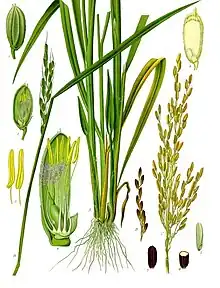дөгө
Bashkir

Дөгө
Etymology
From *dügü (“rice”), from Proto-Turkic *tüg- (“to pound”).
In Bashkir, the initial d- and the retention of -g- indicate that this is a loan from an Oghuz or Karluk source; the expected Kypchak reflex should be tüyü (as attested in Nogai тюй (tyuy, “millet”)). Also consider the related Bashkir verb stem төйөү (töyöw, “thresh, pound”).
Compare Kumyk дюгю (dügü, “rice”), Azerbaijani düyü (“rice”), Turkmen tüwi (“rice”).
Pronunciation
- IPA(key): [dʏ̞ˈɡʏ̞]
- Hyphenation: дө‧гө
Declension
Inflection of дөгө (dögö)
| singular only | |
|---|---|
| absolute | дөгө (dögö) |
| definite genitive | дөгөнөң (dögönöŋ) |
| dative | дөгө (dögö) |
| definite accusative | дөгөнө (dögönö) |
| locative | дөгөлә (dögölä) |
| ablative | дөгөнән (dögönän) |
Hypernyms
- (harvested grains as a food supply) ярма (yarma)
This article is issued from Wiktionary. The text is licensed under Creative Commons - Attribution - Sharealike. Additional terms may apply for the media files.